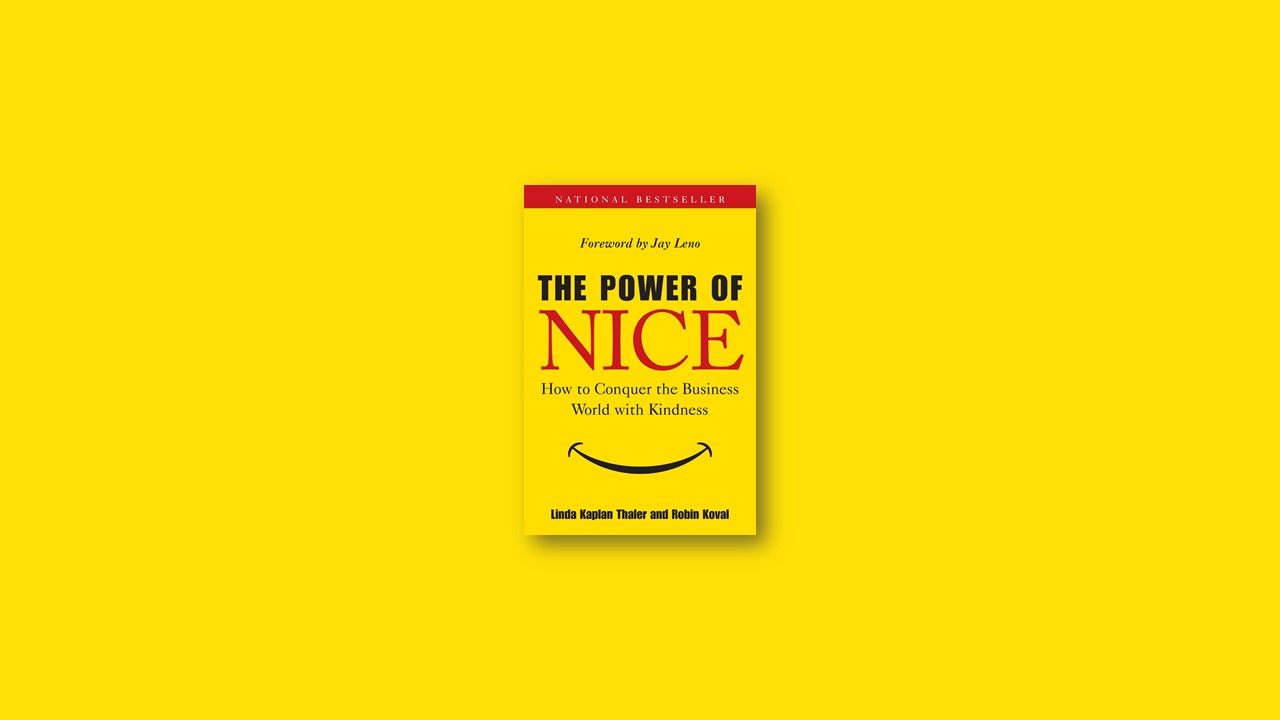Time and time again, we have seen the extraordinary power of nice in our business dealings and in our personal lives. It is the patient passenger who politely asks the airline ticket agent to please check one more time who gets the first-class upgrade, rather than the “I’m a triple platinum member” blowhard. It is the driver who is polite and apologetic to the police officer who sometimes is forgiven for driving over the speed limit.
But nice has an image problem. Nice gets no respect. To be labeled “nice” usually means the other person has little else positive to say about you. To be nice is to be considered Pollyanna and passive, wimpy, and Milquetoast.
Let us be clear: Nice is not naïve. Nice does not mean smiling blandly while others walk all over you. Nice does not mean being a doormat. In fact, we would argue that nice is the toughest four-letter word you’ll ever hear. It means moving forward with the clear-eyed confidence that comes from knowing that being very nice and placing other people’s needs on the same level as your own will get you everything you want.
The Power of Nice
Think about it:
- Nice is luckier in love. People who are low-key and congenial have one-half the divorce rate of the general population, says a University of Toronto study.
- Nice makes more money. According to Professor Daniel Goleman, who conducted research on how emotions affect the workplace for his book Primal Leadership, there is a direct correlation between employee morale and the bottom line. One study found that every 2 percent increase in the service climate—that is, the general cheerfulness and helpfulness of the staff—saw a 1 percent increase in revenue.
- Nice is healthier. A University of Michigan study found that older Americans who provide support to others— either through volunteer work or simply by being a good friend and neighbor—had a 60 percent lower rate of premature death than their unhelpful peers.
- Nice spends less time in court. One study found that doctors who had never been sued spoke to their patients for an average of three minutes longer than physicians who had been sued twice or more, reports Malcolm Gladwell in his book Blink: The Power of Thinking Without Thinking.
It is often the small kindnesses—the smiles, gestures, compliments, favors—that make our day and can even change our lives.
The Power of Nice Principle #1
Positive impressions are like seeds.
Every time you smile at a messenger, laugh at a coworker’s joke, thank an assistant, or treat a stranger with graciousness and respect, you throw off positive energy. That energy makes an impression on the other person that, in turn, is passed along to and imprinted on the myriad others he or she meets. Such imprints have a multiplier effect.
And ultimately, those favorable impressions find their way back to you. That doesn’t mean the waiter you tipped well will one day found a Fortune 100 company and offer you stock options (unless it was one hell of a tip). The results of the power of nice are rarely that direct. In fact, you may not notice any impact on your life for years, apart from the warm glow it gives you inside.
The Power of Nice Principle #2
You never know.
So it pays to be nice to Donald Trump’s wife. But we’re all smart enough to cooperate with the important people in our lives—the people we interact with often, like neighbors and coworkers, and the people involved in important transactions, such as mortgage brokers and prospective employers. We’re much less likely, however, to worry about, say, a stranger whom we’ll never see again. Too often, our thinking is “What does it matter?”
You have to treat everyone you meet as if they are the most important person in the world because they are. If not to you, then to someone; and if not today, then perhaps tomorrow.
The Power of Nice Principle #3
People change.
One common mistake people make is assuming that you only have to be nice to your peers and their superiors. There’s no need to be nice to an assistant or receptionist, much less a security guard or a cleaning person. After all, they can’t do anything for you—they have no power. That may or may not be true—now. But you have no idea who might become quite important to you ten, twenty, or thirty years from now.
The Power of Nice Principle #4
Nice must be automatic.
A friend recently told the story of three consulting companies vying for a very large contract. One was summarily dropped, even though the firm did a terrific presentation. Why? they wondered. It turned out that when the prospective client arrived at the airport, an executive from one of the consulting firms neglected to help with her bags. He lost the contract right there. She was miffed at his rudeness and lack of manners, and decided that she didn’t want to do business with them. Here their team had worked day and night to give the client a knockout presentation, and the entire account was lost over a suitcase.
The negligent executive certainly knew the client was a VIP. So why didn’t he pick up the bag? Simple: He wasn’t skilled in the art of being nice. If it had been part of the way he treated everyone, the oversight never would have occurred. Picking up the bag for the client would have been second nature, instead of a once-in-a-while gesture granted only to clients and bosses and other important people. He would have understood that such small gestures and actions can have an enormous impact.
The Power of Nice Principle #5
Negative impressions are like germs.
Whenever you’re aloof to someone who you think “doesn’t matter,” people unconsciously react to that. You might get a better table if you scream at a waitress for service, but we can assure you that your date will silently be saying, “Check, please.” Just as positive actions are like seeds, rude gestures and remarks are like germs—you may not see the impact they have on you for a while, but they are there, silently infecting you and everyone around you.
Not spreading germs means being extremely conscientious about your environment and the people around you. Because even a simple misunderstanding can create a negative impression.
The Power of Nice Principle #6
You will know.
Even if you never see a person you have treated badly again, even if no one sees or knows of your rudeness or bad behavior, you will know. It will be in your mind and heart when you walk into a meeting and try to convince the people in the room that they should put their faith in you.
Because you won’t believe in yourself, you could jeopardize the outcome of a meeting or relationship. The power of nice is not about running around manically smiling and doing everyone’s bidding, all the while calculating what you’ll get in return. It’s not about being phony or manipulative. It’s about valuing niceness—in yourself and in others—the same way you respect intelligence, beauty, or talent. Niceness is a powerful force. In fact, it can literally save your life.


